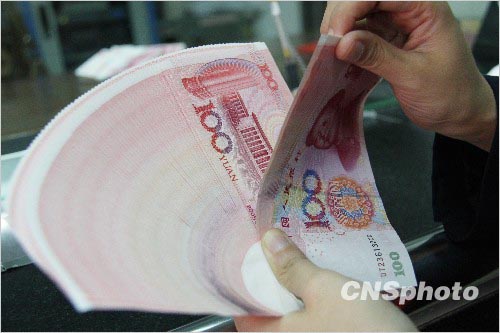
(Ecns.cn) -- The latest move by China's central bank toward a more flexible interest-rate regime has unleashed new competitive forces that will reduce short-term bank profits. Analysts say the banks must now accelerate the process of transformation to meet the challenge, reports the Beijing News.
The announcement by the People's Bank of China (PBOC) took effect on June 8, lowering the benchmark interest rate for savers and borrowers by 25 basis points. It also allows banks to set deposit rates 10 percent above the benchmark level and to provide loans at 80 percent of the benchmark lending rate.
Although it seems like a minor adjustment, it is an important first step toward dismantling a ceiling on deposit rates that the government had previously used to limit competition among banks. It has also shined a light in the direction that China's policymakers are looking to take in the long term.
Now, all banks must fight for customers – including both large companies and individuals – and fat interest-rate margins are no longer guaranteed.
A coming battle
Ms Liu is a small lender in Beijing who is keeping a close eye on the deposit interest rates of different banks. Liu says some banks change their deposit rates daily.
According to the Beijing News, many bank managers desperate to win customers are also paying close attention to interest rate adjustments by other banks.
On the first day the PBOC's new policy took effect, small banks such as the United Rural Cooperative Bank, the Bank of Ningbo, the Bank of Suzhou and the Guangdong Huaxing Bank all announced rates to depositors equivalent to 110 percent of the benchmark deposit rate.
Following their steps, China's four biggest banks – the Agricultural Bank of China, the Industrial & Commercial Bank of China, the Bank of China and the Construction Bank of China – also announced a unanimous deposit rate hike of 8 percent above the benchmark.
The state-owned banks reacted so quickly that they caught us unprepared, said Mr. Han, manager of a shareholding bank.
On June 10, some shareholding banks adjusted deposit rates that had been announced a day earlier in order to make themselves more competitive.
Guo Tianyong, a professor at the Central University of Finance and Economics, said although there is little possibility that the banks will change their deposit rates every day, such adjustments will be made more frequently than before.
Profits will be hurt
When banks raise their deposit interest rates, annual profits for the entire sector will be hurt slightly, about 5 to 10 percent, predicts UBS Securities.
Weaker interest earnings are a clear threat to profitability. Commercial and small banks will be greatly affected (compared to state-owned banks that have solid customer flows) because they must offer higher deposit rates to attract funds amid increasing competition, which will narrow interest rate differentials.
Guo Tianyong agreed that raising deposit rates will eat into the banks' profits. The sector's annual net profit from interest will be reduced by at least 140 billion yuan (US$22 billion), he said.
The combined net profit of Chinese banks was 1.04 trillion yuan (US$163.32 billion) in 2011, up 36 percent from a year earlier, according to data from the country's banking regulator.
If the central bank cuts benchmark rates further in the next half of the year, the situation will be even more serious, and annual net profit growth from interest for banks may be zero in 2013, said China International Capital Corporation (CICC).
Guo said this is also a response to public questioning of the banking sector's exorbitant profits, which have largely come from interest differentials.
Transformation needed
Although Chinese banks will face falling profits in the short run, interest-rate reform will also lower their costs, which could help stabilize China's economic growth, analysts say.
What the banks should do now is hasten their transformation, because the government's move to gradually liberalize the country's interest rates is a life-or-death challenge for the whole sector, commented Ma Weihua, president of China Merchants Bank.
The challenge is especially serious for small banks, which must innovate financial products and develop comprehensive operations instead of chasing high-yield loans that carry more risk, Ma said.
Banks such as China Merchants Bank had already foreseen the current situation and started transformation early, said the Beijing News. And by turning an extensive business pattern into an intensive management mode, they are able to improve returns on equity and the value of bank assets, said Ma Weihua.
Last year, the Chinese banking sector's intermediary revenue increased to 19.3 percent of its total profits, which largely cut reliance on interest income.

Copyright ©1999-2011 Chinanews.com. All rights reserved.
Reproduction in whole or in part without permission is prohibited.